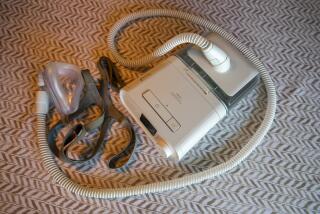Science / Medicine : Home Uterine Monitor Criticized
- Share via
A device widely used to monitor pregnant women at home fails to prevent premature delivery, costs too much and should never have been approved by the U.S. Food and Drug Administration for routine use, a group of obstetricians argued last week in the New England Journal of Medicine.
The device, called the Genesis home uterine activity monitor, is intended to detect preterm labor early so it can be stopped. It was approved a year ago and has been used so far by more than 75,000 women, according to its maker, Tokos Medical Corp. of Santa Ana.
“It is a very bad example of how technology is getting into clinical practice with great cost without any proof of benefit,” said Dr. Benjamin P. Sachs of Beth Israel Hospital in Boston.
The device was approved only to monitor the pregnancies of women who already had given birth prematurely. The critics said they believed, through conversations with other doctors, that the device already is being widely used by women who are not in this high-risk category. However, Craig Davenport, president of Tokos, contended in an interview that the device is being used appropriately, and insurance companies refuse to pay for those who do not need it.





